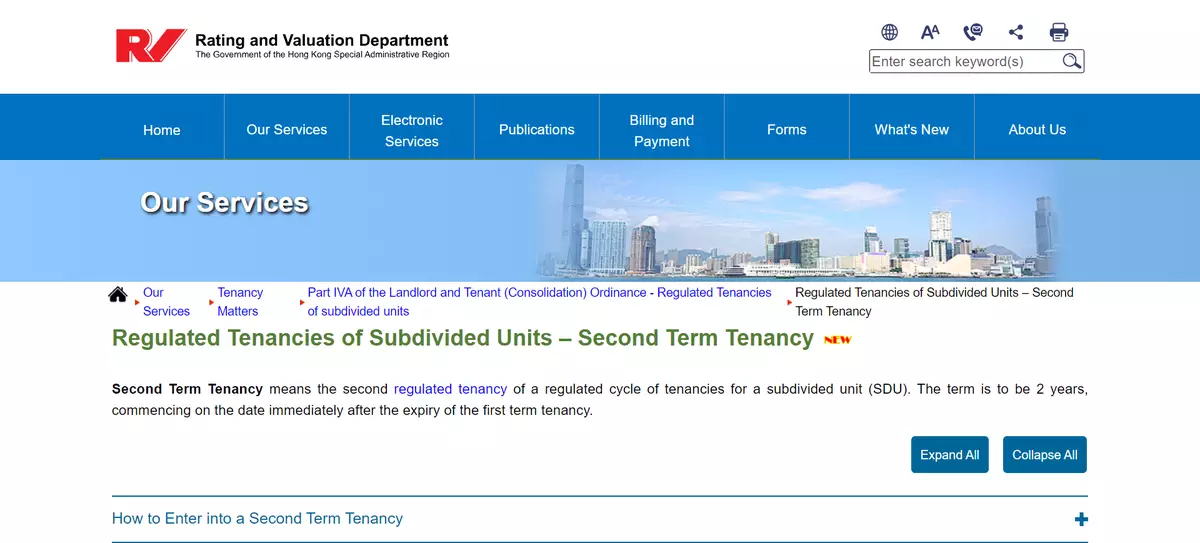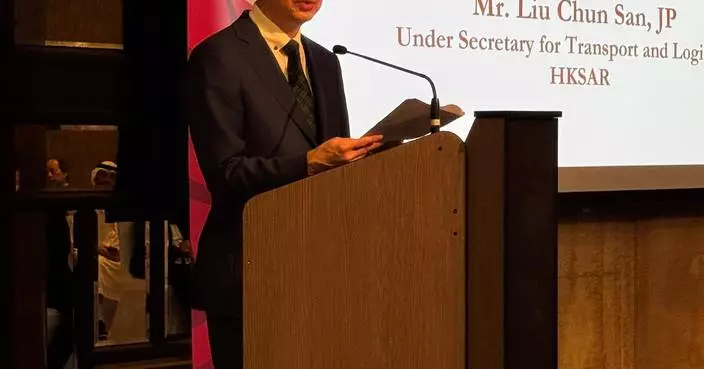13 landlords of subdivided units under regulated tenancies convicted of contravening relevant statutory requirements
Thirteen landlords of subdivided units (SDUs), who contravened Part IVA of the Landlord and Tenant (Consolidation) Ordinance (Cap. 7) (the Ordinance), pleaded guilty and were fined a total of $40,400 today (October 4) at the Eastern Magistrates' Courts. Since the Ordinance came into force, the Rating and Valuation Department (RVD) has successfully prosecuted 415 cases involving a total of 358 SDU landlords, with fines ranging from $400 to $34,800, amounting to a total of $857,410.
The offences of these landlords include (1) failing to submit a Notice of Tenancy (Form AR2) to the Commissioner of Rating and Valuation within 60 days after the term of the regulated tenancy commenced; and (2) requesting the tenant to pay money other than the types permitted under the Ordinance (i.e. requiring the tenant to pay an amount of rent for the second-term tenancy exceeding the maximum amount of rent permitted under the Ordinance). One of the landlords committed nine offences under (1) and (2) and was fined $8,000.
The RVD earlier discovered that the landlords failed to comply with the relevant requirements under the Ordinance. Upon an in-depth investigation and evidence collection, the RVD prosecuted against the landlords.
A spokesman for the RVD reiterated that SDU landlords must comply with the relevant requirements under the Ordinance, including prohibiting the landlords from requiring the tenant to pay an amount of rent for the second-term tenancy exceeding the maximum amount of rent permitted under the Ordinance, and also reminded SDU tenants of their rights under the Ordinance. He also stressed that the RVD will continue to take resolute enforcement action against any contraventions of the Ordinance. Apart from following up on reported cases, the RVD has been adopting a multipronged approach to proactively identify, investigate and follow up on cases concerning landlords who are suspected of contravening the Ordinance. In particular, the RVD has been requiring landlords of regulated tenancies to provide information and reference documents of their tenancies for checking whether the landlords concerned have complied with the requirements of the Ordinance. If a landlord, without reasonable excuse, refuses to provide the relevant information or neglects the RVD's request, the landlord commits an offence and is liable to a maximum fine at level 3 ($10,000) and to imprisonment for three months. Depending on the actual circumstances, and having regard to the information and evidence collected, the RVD will take appropriate actions on individual cases, including instigating prosecution against suspected contraventions of the Ordinance.
To help curb illegal acts as soon as possible, members of the public should report to the RVD promptly any suspected cases of contravening the relevant requirements. Reporting can be made through the telephone hotline (2150 8303), by email (enquiries@rvd.gov.hk), by fax (2116 4920), by post (15/F, Cheung Sha Wan Government Offices, 303 Cheung Sha Wan Road, Kowloon), or in person (visiting the Tenancy Services Section office of the RVD at Room 3816-22, 38/F, Immigration Tower, 7 Gloucester Road, Wan Chai, Hong Kong, and please call 2150 8303 to make an appointment). Furthermore, the RVD has provided a form (Form AR4) (www.rvd.gov.hk/doc/en/forms/ar4.pdf) on its website to facilitate SDU tenants' reporting to the RVD.
The RVD reminds that pursuant to the Ordinance, a regulated cycle of regulated tenancies is to comprise two consecutive regulated tenancies (i.e. the first-term tenancy and second-term tenancy) for an SDU, and the term of each regulated tenancy is two years. A tenant of a first-term tenancy for an SDU is entitled to be granted a second-term tenancy of the regulated cycle, thus enjoying a total of four years of security of tenure. Since the first batch of regulated tenancies has already approached their second-term tenancies, the RVD has started a new round of publicity and education work in order to assist SDU landlords and tenants to understand the important matters pertaining to the second-term tenancy, and procedures that need to be followed about two months prior to the commencement of the purported second-term tenancy. In addition, the RVD has started issuing letters enclosing relevant information to the landlords and tenants concerned of regulated tenancies in batches, according to the expiry time of their first-term tenancies, to remind them about their respective obligations and rights under the Ordinance. These landlords and tenants may also visit the dedicated page for the second-term tenancy on the RVD's website (www.rvd.gov.hk/en/tenancy_matters/second_term_tenancy.html) for the relevant information, including a concise guide, brochures, tutorial videos and frequently asked questions. SDU landlords and tenants are also advised to familiarise themselves with the relevant statutory requirements and maintain close communication regarding the second-term tenancy for handling the matters properly and in a timely manner according to the Ordinance.
For enquiries related to regulated tenancies, please call the telephone hotline (2150 8303) or visit the RVD's webpage (www.rvd.gov.hk/en/our_services/part_iva.html) for the relevant information.
LC: Speech by CS for proposed resolutions moved under Legal Aid Ordinance and Criminal Procedure Ordinance
Following is the speech (translated from Chinese) by the Chief Secretary for Administration, Mr Chan Kwok-ki, for the proposed resolutions under the Legal Aid Ordinance (LAO) and the Criminal Procedure Ordinance in the Legislative Council (LegCo) today (December 11):
Mr President,
I move that my first motion, as printed on the Agenda, be passed to adjust the financial eligibility limits (FELs) for legal aid applicants. Later, I will sequentially move that the other two legal aid-related motions as printed on the Agenda be passed, seeking to adjust the Director of Legal Aid (DLA)'s First Charge and make the Legal Aid in Criminal Cases (Amendment) Rules 2024 to adjust the criminal legal aid fees respectively.
First, I introduce the first Resolution.
Legal aid services form an integral part of the legal system in Hong Kong. The policy objective of legal aid is to ensure that all those who comply with the regulations of the LAO and have reasonable grounds for pursuing or defending a legal action in the courts of Hong Kong will not be denied access to justice due to a lack of means. All legal aid applicants must satisfy both the means test and merits test as provided for in the LAO.
Currently, there are two legal aid schemes under the Legal Aid Department (LAD), namely the Ordinary Legal Aid Scheme (OLAS) and the Supplementary Legal Aid Scheme (SLAS). Different FELs are set for the two schemes in accordance with sections 5 and 5A of the LAO respectively. Pursuant to section 7(a) of the LAO, the LegCo may by resolution amend the relevant FELs.
Pursuant to the mechanism established in 1999, FELs are subject to review annually by making reference to the Consumer Price Index (C) (CPI(C)). According to the latest round of review, for the reference period from July 2023 to July 2024, the CPI(C) has increased by two per cent. Hence, we propose to adjust the FELs upwards by two per cent, namely:
(a) from $440,800 to $449,620 for OLAS; and
(b) from $2,204,030 to $2,248,110 for SLAS.
Mr President, I now introduce the second Resolution.
If a legally aided person is successful in recovering or preserving any money or property in the proceedings concerned, DLA has the right to retain thereunder such sums required for recovering the costs and other expenses incurred by LAD for the legally aided person under section 18A(1) of the LAO. Such right is called the DLA's first charge. However, according to section 18A(5) of the LAO, the DLA's first charge does not apply to the first $9,540 of each monthly payment of maintenance payment. Separately, when DLA is satisfied that the exercise of the DLA's first charge would cause serious hardship to the legally aided person, DLA may in accordance with the principles of fairness and justice exercise discretion to reduce the amount to be retained, provided that the sum to be reduced does not exceed the cap as specified in section 19B(1)(a) of the LAO.
Pursuant to section 22A of the LAO, LegCo may, by resolution, amend the rate of maintenance payments that is exempted from the DLA's first charge, as well as the cap on the amount by which may be reduced in cases of serious hardship.
In response to the increase in CPI(C) by two per cent for the reference period from July 2023 to July 2024 as mentioned above, we propose to accordingly adjust the two above-mentioned specific amounts upwards by two per cent, namely:
(a) the amount specified in section 18A(5) upwards from $9,540 to $9,730, and
(b) the cap on the amount specified in section 19B(1)(a) upwards from $114,140 to $116,420.
Mr President, my third Resolution seeks to make the Legal Aid in Criminal Cases (Amendment) Rules 2024 (Amendment Rules) to adjust the criminal legal aid fees.
At present, LAD pays fees to counsel and solicitors in private practice engaged to undertake litigation work for criminal cases on its behalf (i.e. criminal legal aid fees). The fees are stipulated in the Legal Aid in Criminal Cases Rules (the Rules). Pursuant to section 9A(1) of the Criminal Procedure Ordinance, any amendment to the Rules for adjusting the criminal legal aid fees are subject to the approval of the LegCo.
On the other hand, to ensure that neither LAD nor the Department of Justice (DoJ) would have unfair advantage in competing for the same pool of lawyers, DoJ draws reference to the same scale of fees to engage counsel and solicitors in private practice to appear for the prosecution in criminal cases (i.e. prosecution fees). Duty lawyer fees will be paid to lawyers who provide legal representation to defendants in Magistrates' Courts and Juvenile Courts through the Duty Lawyer Service.
Pursuant to the mechanism established in 1992, the fees mentioned above (i.e. criminal legal aid fees, prosecution fees and duty lawyer fees) are subject to review on a biennial basis to take into account changes in CPI(C) during the reference period.
According to the latest biennial review, the CPI(C) for the reference period (i.e. July 2022 to July 2024) increased by 3.9 per cent. As such, we propose to adjust the Fees upwards by 3.9 per cent accordingly.
We have informed the LegCo Panel on Administration of Justice and Legal Services of the outcome of the reviews regarding the proposed adjustments in the three resolutions mentioned above via an information paper in October 2024. Members raised no objection to the proposed increase. Subject to LegCo's approval of the Resolution, we will implement the proposal upon gazettal of the Resolution.
Separately, when LAD implements the increased criminal legal aid fees, the Government will accordingly adjust the scale of prosecution fees and duty lawyer fees administratively.
I appeal for Members' support for the above three Resolutions. Thank you, Mr President.









